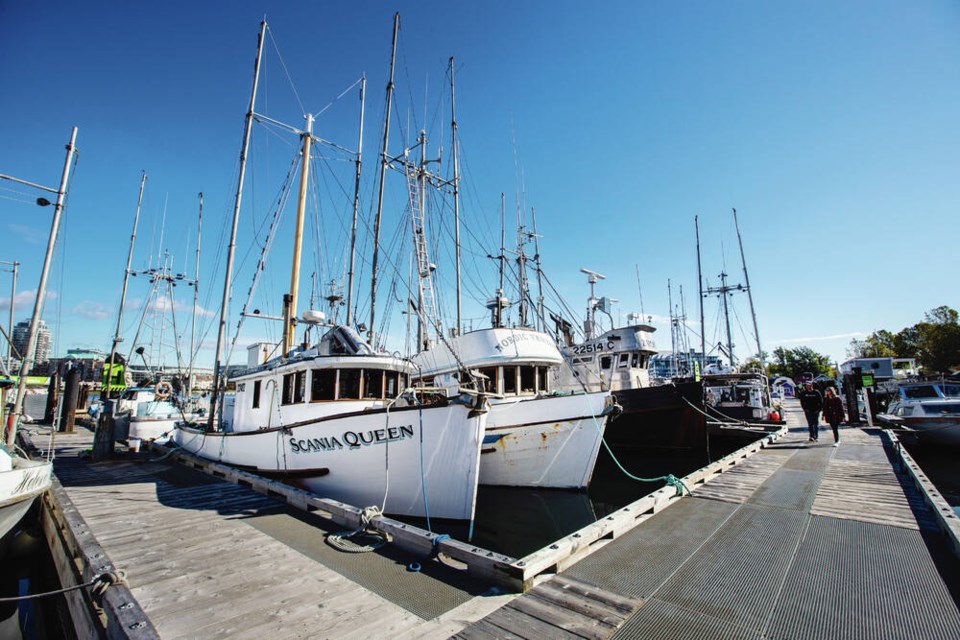A fishing-industry leader is calling on the new federal minister responsible for Fisheries and Oceans to require all owners of fishing licences in B.C. to be active fishers, to combat the increasingly corporate control of the province’s fish stocks.
Sonia Strobel, CEO and co-founder of Skipper Otto, a Vancouver-based enterprise that connects small-scale fishers with customers, says the change is needed to reform what she calls “a modern feudal system.”
The Atlantic provinces have had owner-operator licensing restrictions for years to protect fishing communities.
Last week, Strobel, who has been pushing for the change in B.C. since 2018, initiated a letter-writing campaign to encourage newly appointed Minister of Fisheries and Oceans Joanne Thompson to create a ministerial order requiring DFO to move forward on a similar policy for B.C.
In B.C., there are few restrictions on who can own fishing licences and quotas, which has led over the years to a consolidation of ownership among corporations, speculative investors and retired fisherman, inflating the price of licences and quotas beyond the reach of most working fishers.
“They’re just bought and sold on a market, just like any other investment tools would be,” Strobel said. “We don’t know who owns the fish in the water in perpetuity — we can’t even trace that.”
Strobel said the lack of regulation in B.C. has resulted in a local fishing industry that operates “like a modern feudal system.”
An individual licence and quota can now go for upwards of $2 million. Independent fishers, most of whom are financially locked out of licence and quota ownership, are forced to lease them from owners, at rates set by the owners.
Strobel said one fisher she worked with was offered a rate of 77 to 23 per cent to fish halibut, with 77 per cent of revenue going to the owner, and the remaining 23 per cent going to him to pay for fuel, crew, and “hopefully himself.”
Many of the licence-owners are national and international fish-processing companies, Strobel said.
“They control the supply and the demand,” she said, adding fishers who lease licences also don’t have any agency over when they get to fish, and are often forced to go out in more dangerous weather conditions if the buyer/owner can get a better price then.
“It’s really an untenable situation that we live with here in B.C., and it’s leading to food insecurity, it’s leading to just abysmal incomes for harvesters in our fishing community,” Strobel said.
“We see communities with derelict vessels tied up because no one’s fishing them, communities with all of the knock-on effects of poverty: you know, depression, anxiety, toxic drugs coming into communities that are in despair.”
Strobel said these communities, many of which are Indigenous, are losing their populations to other areas because they’re unable to survive on the income fishing provides.
“The thing people need to understand is that fishing isn’t a job — it’s a way of life,” she said. “That multi-generation knowledge is being lost because communities can’t persist … they can’t pass on their language, their knowledge. It’s about more than pulling floating dollars out of the ocean, it’s about home and place.”
In January, then-Fisheries minister Dianne Lebouthillier began work on a ministerial order that would pave the way for the policy reform, but her work was interrupted by the election.
Now Strobel is calling on Thompson to move forward with the ministerial order.
Alongside organizations like the Canadian Independent Fish Harvesters Federation and the United Fishermen and Allied Workers Union, Strobel is advocating for a B.C. policy that resembles the one already in place in the Atlantic. Phased in over seven years, it would require fishing-licence holders to be active harvesters.
The seven-year timeline would allow current licence-owners to recoup their investments by the time they’re forced to sell, so nobody loses the money they’ve already put in, she said.
“What they would be losing was this dream that they were going to make millions of dollars hand over fist in perpetuity,” Strobel said.
The expectation is that, similar to what took place in the Atlantic provinces, the bulk selling-off of licences would drive prices back down to levels that independent fishers can afford.
Christina Burridge, executive director of the B.C. Seafood Alliance, which represents several commercial licence holders in B.C., among other industry players, said moving toward an owner-operator system in B.C. would be “enormously disruptive to the way we manage fisheries in B.C. for conservation.”
Aside from being disruptive economically, it would be quite difficult to implement, she said.
Compared to the high-volume fisheries on the East Coast, there are “simply too many licences chasing too little fish” in B.C., said Burridge, who doesn’t think a seven-year timeline would allow current licence-owners to recoup their investment.
She argues that in order to implement the policy change, the government would have to buy out the current owners.
Richard Williams, a Halifax-based fisheries consultant who has studied the policies on both coasts, said the comparatively smaller B.C. fishing industry still badly needs a similar policy to the east coast’s.
He said the B.C. industry is capable of providing high-value products for local markets while also providing food security and stable, meaningful employment for fishing communities and First Nations.
“What’s your objective?” Williams said. “Do you want outside investors and vertically integrated companies to harvest all the profits and the surplus economic benefits from those things, or do you want to distribute those benefits and the employment and so on that goes with them across the First Nations and coastal communities?”
Williams said the federal government has “diametrically opposed” policy objectives on the two coasts that has created a stable and equitable fishing industry in the East, while the West languishes.
“Our campaign is very simple: harmonize,” Williams said. “Why are you doing something on the East Coast, with a whole set of very compelling social and economic policy reasons, that you refuse to do on the West Coast?”




